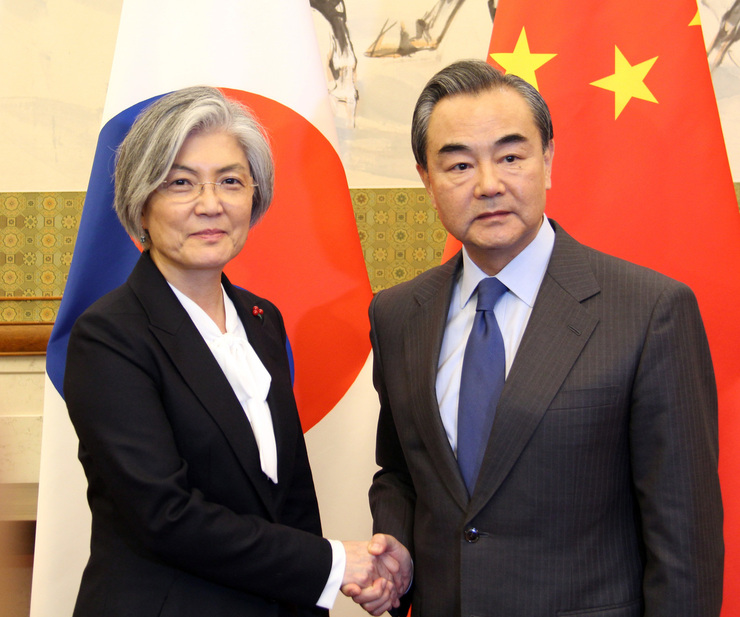 |
|
South Korean Foreign Minister Kang Kyung-wha shakes hands with Chinese Foreign Minister Lee Wang during their summit in Beijing on Nov. 22. (Photo Pool)
|
South Korea and China foreign ministers are coordinating details of summit to improve bilateral relations
South Korea and China have agreed to coordinate a state visit to China by South Korean President Moon Jae-in in mid-December. After the two countries reached an understanding on the THAAD issue on Oct. 31 and after the two leaders officially repaired bilateral relations during multilateral meetings earlier this month, Moon’s state visit may well mark the final stage in normalizing South Korea-China relations. “[South Korea and China] have agreed to arrange a state visit to China by President Moon in mid-December, and our two countries share the view that President Moon’s visit to China will be a major opportunity to reinforce and develop the trend of improving relations between the two countries,” South Korea’s Ministry of Foreign Affairs announced on Nov. 23. This was the agreement reached by South Korean Foreign Minister Kang Kyung-wha and Chinese Foreign Minister Wang Yi in Beijing on Nov. 22. South Korea’s Foreign Ministry interprets China’s willingness to welcome Moon on a state visit, the most formal kind of visit, as a message that China is committed to improving relations. But considering that former South Korean presidents have also made state visits to China, it is not the state visit itself so much as the fact that it is taking place right now that seems to be regarded as significant. “The fact that President Moon is making a state visit to China at this moment seems to imply that the two countries could gradually reach a strategic agreement on the problems they have been unable to resolve thus far,” said Lee Hui-ok, an expert on China who directs the Sungkyun Institute of China Studies. Amid these developments, the meeting of the two foreign ministers showed that the two countries are not on the same page on the THAAD issue, which has yet to be permanently “sealed.” “China values the position expressed by South Korea, namely that it will not join an American missile defense system and that the THAAD battery that is temporarily deployed in South Korea does not harm China’s security interests. We hope that South Korea will continue to act appropriately on this matter,” Wang said during the meeting. Wang was referring to the so-called “three no’s” policy that Kang outlined to a National Assembly audit committee on Oct. 31 (no deployment of another THAAD battery, no participation in the US missile defense network and no movement toward a trilateral military alliance with the US and Japan). When Kang expressed her hope that the difficulties faced by South Korean companies because of China’s retaliation for THAAD would be resolved before Moon’s visit to China, Wang mentioned the statement made by the two countries on Oct. 31 and the position expressed by Chinese President Xi Jinping during the recent summit. At the time, Xi described the THAAD issue as “a key interest and a major concern for both sides,” while in the statement last month, China “clarified once again that it is opposed to the THAAD system deployed in South Korea.” While this reiterated previous statements, it ultimately confirmed once again that the THAAD issue, though placed under a temporary “seal,” could blow up again at any time. “The key is for the government to arrange things such that THAAD does not become an issue again during the summit [between South Korea and China in December],” a senior South Korean government official said. By Kim Oi-hyun, Beijing correspondent Please direct questions or comments to [english@hani.co.kr]






